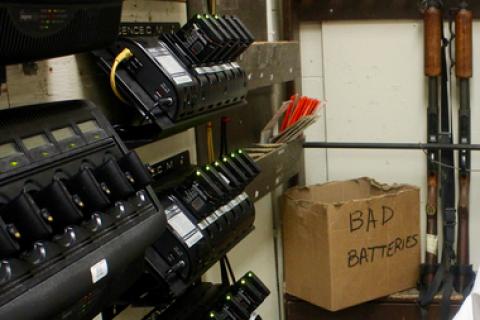CHICAGO — Why are so many police dashcam videos silent?
Chicago Police Department officers stashed microphones in their squad car glove boxes. They pulled out batteries. Microphone antennas got busted or went missing. And sometimes, dashcam systems didn’t have any microphones at all, DNAinfo Chicago has learned.
Police officials last month blamed the absence of audio in 80 percent of dashcam videos on officer error and “intentional destruction.”
A DNAinfo Chicago review of more than 1,800 police maintenance logs sheds light on the no-sound syndrome plaguing Police Department videos — including its most notorious dashcam case.
Maintenance records of the squad car used by Jason Van Dyke, who shot and killed Laquan McDonald, and his partner, Joseph Walsh, show monthslong delays for two dashcam repairs, including a long wait to fix “intentional damage.”
On June 17, 2014, police technicians reported fixing a dashcam wiring issue in police vehicle No. 6412, the squad shared by Van Dyke and Walsh, about three months after it was reported broken, records show.
A day later, the same vehicle's dashcam system was reported busted again. It took until Oct. 8, 2014, to complete repairs of what technicians deemed “intentional damage,” according to reports.
Just 12 days later, on Oct. 20, 2014, dashcam video recorded from squad car No. 6412 on the night Van Dyke shot and killed McDonald did not record audio. The video that went viral showing Van Dyke killing Laquan was taken from a different squad car, but it, too, had no audio.
And on Nov. 21, 2014, a review of 10 videos downloaded from Van Dyke's squad car dashcam determined it was “apparent … that personnel have failed to sync the MICs ,” police records show.
Van Dyke has been charged with first-degree murder in Laquan's shooting. And Walsh, who filed reports backing up Van Dyke’s version of events that didn’t jibe with the video of the shooting, has been placed on desk duty as criminal and disciplinary investigations continue.
Four other police vehicles at Laquan's shooting scene that had dashcam systems also failed to record audio. Only two of the five vehicles had dashcams that actually captured video.
The dashcam in police vehicle No. 8489, shared by officers Thomas Gaffney and Joseph McElligott the night of Laquan's shooting, recorded 37 “event videos” in October 2014, and had an operational dashcam the night of the shooting. But “due to disk error” no video was recorded at the shooting scene, according to police reports.
Police maintenance records show a request to repair the dashcam in that squad car was made Oct. 15, 2014 — five days before Laquan's shooting. Yet, on Oct. 31, 2014, technicians found “no problems” with the equipment.
A week later, the dashcam system was reported broken again. Repairs to a “hardware failure” were completed more than four months later, police records show.
Police vehicle No. 8756 had a working dashcam that recorded 124 “event videos” in October 2014 without a single request for maintenance that month.
But on the night of Laquan's shooting, the vehicle assigned to Arturo Bacerra and Leticia Valez reportedly had a “power issue” and the dashcam was “not engaged.”
It wasn’t until Nov. 23 that a repair request was issued for that squad car’s dashcam. Less than two weeks later, technicians reported, “no problems found,” police records show.
No microphones
Between Sept. 1, 2014, and July 16, 2015, maintenance technicians assigned to troubleshoot and repair dashcam systems reported 90 incidents where no microphones were found in squad cars, according to police logs.
Another 13 inspections during that period turned up only one microphone in squad cars that were supposed to be equipped with two audio recording devices, according to the logs.
On 30 occasions, technicians who downloaded dashcam videos found evidence that audio recording systems either had not been activated or were “intentionally defeated” by police personnel, the records show.
It wasn’t until the absence of sound on the videos from Laquan's shooting that problems with dashcam systems came to light.
Police officials quickly placed the blame on officers and shift supervisors responsible for making sure dashcam systems work properly before officers go on patrol.
In December, interim Police Supt. John Escalante warned the rank and file that they would be disciplined for failing to follow proper dashcam protocol. Weeks later, he followed through by hitting some officers and supervisors with formal reprimands and up-to-three-day suspensions.
“To boil this down, the Police Department will not tolerate officers maliciously destructing equipment,” police spokesman Anthony Guglielmi said.
“Supt. Escalante sent a very clear message and has held people accountable. And since we took that corrective action, we have seen a more than 70 percent increase in the amount of uploads at the end of each tour … and that is being audited weekly with reports sent to the superintendent.”
Fraternal Order of Police President Dean Angelo has called Escalante’s punishment of the rank and file over dashcam video disrepair an attempt to deflect blame away from the Police Department and City Hall.
“How they determine that it’s purposely caused damages, I’d like to know,” Angelo said last month. “How they can figure out what is mechanical or what is human error, I’d like to know.”


Spread the word